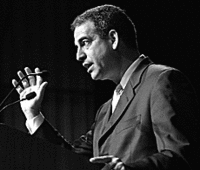
As a Wisconsin native, I've long admired
Senator Russ Feingold for somehow balancing the role of the maverick with that of the pragmatist. A truly honorable guy, as I see it, he's been a hero of
Wellstonian proportions to me ever since he won his first term as US Senator in '92. And today's
Salon.com interview confirms that, despite presidential aspirations, his independent streak is firmly intact: he's the only Senator to have voted against the Patriot Act, yet he supported the nomination of John Roberts to the Supreme Court; now he's the only Senator to set a timeline for the withdrawal of troops from Iraq—December 31, 2006. An excerpt:
If after President Bush left, Harry Reid, Nancy Pelosi and Howard Dean came to your office and said, "We need a more unified Democratic message on Iraq," would you agree that there is a problem with the Democratic message?
Absolutely. There is a real timidity and weakness in terms of Democrats being willing to stand up to this error of American foreign policy. I think one of the greatest errors in American foreign policy in our modern lives is the divergence into Iraq that was done by the president. It is not sufficient for Democrats to point out the dishonest way we were taken into war. Nor is it sufficient for Democrats to simply point out that what is being done now is extremely mistaken. Democrats have to talk in terms of a strategy that, if they were in the White House, they would implement to successfully finish this particular mission, but more importantly, to get back to the real focus on the terrorist networks that attacked us on 9/11.
The Democratic message shouldn't begin with Iraq. The Democratic message should begin with, "We are committed to fighting and defeating the terrorist elements that attacked us on 9/11."
Why don't you think the Democrats have taken these steps? Why is there this confusion, this hedging?
Fear.
Of what?
Fear of being accused of not being supportive of the troops, which of course is an outrageous response to reasonable questions about Iraq. But it does tend to intimidate people. Fear that somehow people will be accused of being unpatriotic. Fear that the president will say, as he almost always does, that those criticizing the Iraq war don't understand the lessons of 9/11.
I think it is President Bush who doesn't understand the lessons of 9/11. I think it's President Bush who hasn't even read carefully the 9/11 report, which clearly defines the threat we are facing. The threat we are facing is this international terrorist network that attacked us, and the amount of radicalism that may exist among Islamic peoples that can provide the recruits to fuel the international terrorist network. The president doesn't understand the difference between what is going on in Iraq and that effort.
 As a Wisconsin native, I've long admired Senator Russ Feingold for somehow balancing the role of the maverick with that of the pragmatist. A truly honorable guy, as I see it, he's been a hero of Wellstonian proportions to me ever since he won his first term as US Senator in '92. And today's Salon.com interview confirms that, despite presidential aspirations, his independent streak is firmly intact: he's the only Senator to have voted against the Patriot Act, yet he supported the nomination of John Roberts to the Supreme Court; now he's the only Senator to set a timeline for the withdrawal of troops from Iraq—December 31, 2006. An excerpt:
As a Wisconsin native, I've long admired Senator Russ Feingold for somehow balancing the role of the maverick with that of the pragmatist. A truly honorable guy, as I see it, he's been a hero of Wellstonian proportions to me ever since he won his first term as US Senator in '92. And today's Salon.com interview confirms that, despite presidential aspirations, his independent streak is firmly intact: he's the only Senator to have voted against the Patriot Act, yet he supported the nomination of John Roberts to the Supreme Court; now he's the only Senator to set a timeline for the withdrawal of troops from Iraq—December 31, 2006. An excerpt:
No comments:
Post a Comment